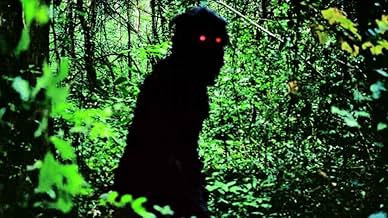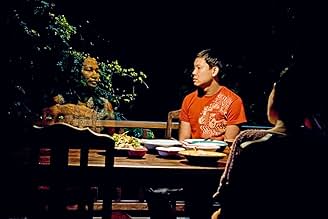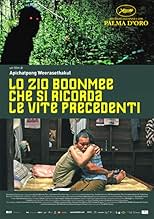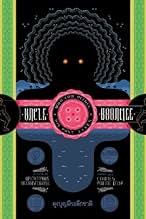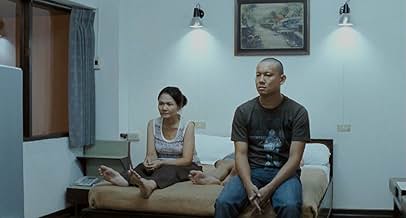CALIFICACIÓN DE IMDb
6.7/10
18 k
TU CALIFICACIÓN
Un hombre que se está muriendo de una enfermedad renal pasa sus últimos y sombríos días con su familia, incluido el fantasma de su esposa y un espíritu del bosque que antes fue su hijo, en u... Leer todoUn hombre que se está muriendo de una enfermedad renal pasa sus últimos y sombríos días con su familia, incluido el fantasma de su esposa y un espíritu del bosque que antes fue su hijo, en una granja del norte de Tailandia.Un hombre que se está muriendo de una enfermedad renal pasa sus últimos y sombríos días con su familia, incluido el fantasma de su esposa y un espíritu del bosque que antes fue su hijo, en una granja del norte de Tailandia.
- Dirección
- Guionistas
- Elenco
- Premios
- 11 premios ganados y 25 nominaciones en total
Kanokporn Tongaram
- Roong
- (as Kanokporn Thongaram)
- …
- Dirección
- Guionistas
- Todo el elenco y el equipo
- Producción, taquilla y más en IMDbPro
Opiniones destacadas
I'll be frank. Whether or not you enjoy this movie will depend largely on whether or not you are a die hard film buff or a casual movie goer looking for a story. If you are the later, then aside from the eerie sight of the red eyed Monkey Spirits, you will come away disappointed.
That said, there is much in Uncle Boonmee to like, but like the Buddhist aesthetic the film is steeped in, you have to be ready for it. Because this is one film that demands a lot of patience of the viewer.
Set in rural Isan Province, Thailand, the story follows the last days of a well to-do farmer, the titular Boonmee, who is dying of a terminal illness. Like all dying men, Boonmee can't help but wax philosophic, both on the nature of death itself and on his own past mistakes, and one night while eating with his family is suddenly and abruptly joined by two spirits, the first of his dead wife, Huay, the second that of his missing son, Boonsong, who has inexplicably been transformed into a black monkey. Anyone even remotely familiar with the prior work of Director Weerasethakul (try saying that with a mouthful of marbles), particularly Tropical Malady, will know that such surrealism is a common theme in his films, with its signature mix of traditional Thai Buddhism and animist lore. As in Tropical Malady, the day belongs to the living and the mundane, but night brings on ghosts, animal spirits, the shades of ancestors, and the inner musings and anxieties of Weerasethakul's characters.
The film itself feels much like a Buddhist temple; with its long uninterrupted and unadorned shots, and its devotion to capturing trivial moments, it is not so much a vehicle for storytelling as contemplation. The last film to be shot with celluloid as opposed to digital, it is the director's self-admitted funerary ode to a dying medium.
That said, there is much in Uncle Boonmee to like, but like the Buddhist aesthetic the film is steeped in, you have to be ready for it. Because this is one film that demands a lot of patience of the viewer.
Set in rural Isan Province, Thailand, the story follows the last days of a well to-do farmer, the titular Boonmee, who is dying of a terminal illness. Like all dying men, Boonmee can't help but wax philosophic, both on the nature of death itself and on his own past mistakes, and one night while eating with his family is suddenly and abruptly joined by two spirits, the first of his dead wife, Huay, the second that of his missing son, Boonsong, who has inexplicably been transformed into a black monkey. Anyone even remotely familiar with the prior work of Director Weerasethakul (try saying that with a mouthful of marbles), particularly Tropical Malady, will know that such surrealism is a common theme in his films, with its signature mix of traditional Thai Buddhism and animist lore. As in Tropical Malady, the day belongs to the living and the mundane, but night brings on ghosts, animal spirits, the shades of ancestors, and the inner musings and anxieties of Weerasethakul's characters.
The film itself feels much like a Buddhist temple; with its long uninterrupted and unadorned shots, and its devotion to capturing trivial moments, it is not so much a vehicle for storytelling as contemplation. The last film to be shot with celluloid as opposed to digital, it is the director's self-admitted funerary ode to a dying medium.
I really do wish I could like this. As it is, I think it has some dazzling sequences, and some really atmospheric and hypnotizing scenes. For the most part though, it didn't amount to much for me, and that's because I was just really bored by a lot of it. This really just comes down to whether one is hypnotized or bored by it, and unfortunately for me it was the latter. That doesn't mean that it's an awful film, it has way too much originality in what I saw to label it as such (and whether it has anything to really say is anyone's guess). Still, I wouldn't recommend this to most people, simply because it's so hard to get into. Not recommended.
This was a hard film to rate. It pains me not to have fallen in love with it. Here, then, are some scattered thoughts of my failed romance.
It started with a very sour first date. It also ended there.
I went in looking to see a film that won the Golden Palm at Cannes 2010. Knowing this fact, and having seen the trailer, I went to the theater expecting to see an art house piece with Oriental metaphysical overtones. What I saw was, to be sure, a decisively original and at times hauntingly beautiful film, but one that I found an absolute bore: a film that, to me, seemed a tiresome, dysfunctional, inchoate potpourri of disjunct elements that never quite flowed together.
Perhaps false expectations can ruin a movie. Or, perhaps, let me hazard the unlikely suggestion, there is nothing here to salvage? For let me be clear: I wanted to like this film, I really did. It is important to reward originality and craftsmanship, always. And I respect the film (or at least its intentions). But the fact remains (here comes the unavoidable, brutal, decisive fact), I didn't like it. I only liked a few scenes here and there. Some parts I hated, absolutely loathed. Despite a few glimmerings of genius - and an undoubted air of originality - it seems to be that Uncle Boonmee is a needlessly difficult, slow-paced and ultimately unsuccessful film... despite the fact that it gets to a great start and carries a lot of potential all the time. Perhaps the "elusive" quality mentioned by the high-praise reviewers is a mask behind which there is no greater coherence to be found. Perhaps the inchoate structure and the belaboured pacing are not marks of genius but amateurish vices committed in the name of some grand vision that shall forever remain out of our material reach. I fault this film not because of its weird themes or its occasional dream logic. On the contrary, I think that it may even be that the film wasn't weird enough or dreamy enough; perhaps this film's use of "magic realism" is a kind of materialistic trap that forces the movie into long, never-ending sequences of absolutely no consequence. The main vice of the film is its unadventurous reliance on fixed camera frames and boring, dragging shots. Editing between the scenes is tortuously snail-paced and almost morphine-mimicking in its soporific entailments.
Whatever the reason, the film feels too much jumbled together, like some heavy stone stuck in a spiritual limbo, or a unicorn eating a burger, or some such nonsense. Ironically, the main stumbling block for the film, if you ask me, is not its "artsiness", but its clumsy down-to-Earthness. The film seems to be grasping for some supreme realism and materialism underneath its spiritual, religious and metaphysical surface. But the result is a kind of Ken Loach of Buddhism: a boring materialism under the guise of animistic spiritualism. Just plain realism without a purpose: people doing boring stuff for boring reasons.
Or perhaps all this is wrong; perhaps all this analysis is useless. Perhaps we are back to false expectations again: I expected one thing and saw another. But who cares WHY I didn't like it? Surely all this is uninteresting? Well, perhaps, but let me say that my personal dilemma - how I wanted to love this film so much but ended up almost hating it - is an interesting story to tell, because this film has the potential to divide audiences totally, into "haters" and "praisers" - and very few lukewarm receivers in between. I definitely recommend this film to be seen, but I am not going to play the art house card, the usual cop-out: "I'm sure it's a masterpiece, I just didn't get it", and then give it a score of 8 or 9 despite having hated it myself, out of some duty-bound, deranged, depersonalized sense of professional duty or peer pressure to agree with everybody else, or - worse yet - pretend to love the film because of some unhealthy respect for the jury at Cannes or the snidely snobbish world film press. No, this would be a scandalous road to take. One must stand by one's convictions, and it is my personal conviction, based on one viewing, that here we have an ultimately pretty bad film: a failed exercise at grafting something sublime. Despite its undoubtedly pure and original intentions and beginnings, this film remains an overrated (soon to be over-venerated), perplexing, highly original turd - interesting but ultimately vacuous, like some of Buñuel's lesser works, or like Andy Warhol's art.
Whether I change my opinion after a second, or third, viewing remains to be seen. So, despite my dislike of the film's overall structure, I feel that this is an important film, and I can easily recommend it to all movie lovers. Everyone remotely interested in film should go and see, form their OWN opinion, of such a remarkable cinematic piece: a film that, despite its flaws and vices, is undoubtedly a creation of unique character and visionary qualities. Weerasethakul's directorial voice is loud and persistent, and its echo will surely be heard for many years to come across the lands - and cinema screens - the world over.
Now, let him only refine his voice a bit and convince us skeptics.
Whether my love for this film will grow, who knows. I'm preparing for the inevitable "second date" - the future second attempt at falling in love - with a strange expectation of more melancholy moods.
It started with a very sour first date. It also ended there.
I went in looking to see a film that won the Golden Palm at Cannes 2010. Knowing this fact, and having seen the trailer, I went to the theater expecting to see an art house piece with Oriental metaphysical overtones. What I saw was, to be sure, a decisively original and at times hauntingly beautiful film, but one that I found an absolute bore: a film that, to me, seemed a tiresome, dysfunctional, inchoate potpourri of disjunct elements that never quite flowed together.
Perhaps false expectations can ruin a movie. Or, perhaps, let me hazard the unlikely suggestion, there is nothing here to salvage? For let me be clear: I wanted to like this film, I really did. It is important to reward originality and craftsmanship, always. And I respect the film (or at least its intentions). But the fact remains (here comes the unavoidable, brutal, decisive fact), I didn't like it. I only liked a few scenes here and there. Some parts I hated, absolutely loathed. Despite a few glimmerings of genius - and an undoubted air of originality - it seems to be that Uncle Boonmee is a needlessly difficult, slow-paced and ultimately unsuccessful film... despite the fact that it gets to a great start and carries a lot of potential all the time. Perhaps the "elusive" quality mentioned by the high-praise reviewers is a mask behind which there is no greater coherence to be found. Perhaps the inchoate structure and the belaboured pacing are not marks of genius but amateurish vices committed in the name of some grand vision that shall forever remain out of our material reach. I fault this film not because of its weird themes or its occasional dream logic. On the contrary, I think that it may even be that the film wasn't weird enough or dreamy enough; perhaps this film's use of "magic realism" is a kind of materialistic trap that forces the movie into long, never-ending sequences of absolutely no consequence. The main vice of the film is its unadventurous reliance on fixed camera frames and boring, dragging shots. Editing between the scenes is tortuously snail-paced and almost morphine-mimicking in its soporific entailments.
Whatever the reason, the film feels too much jumbled together, like some heavy stone stuck in a spiritual limbo, or a unicorn eating a burger, or some such nonsense. Ironically, the main stumbling block for the film, if you ask me, is not its "artsiness", but its clumsy down-to-Earthness. The film seems to be grasping for some supreme realism and materialism underneath its spiritual, religious and metaphysical surface. But the result is a kind of Ken Loach of Buddhism: a boring materialism under the guise of animistic spiritualism. Just plain realism without a purpose: people doing boring stuff for boring reasons.
Or perhaps all this is wrong; perhaps all this analysis is useless. Perhaps we are back to false expectations again: I expected one thing and saw another. But who cares WHY I didn't like it? Surely all this is uninteresting? Well, perhaps, but let me say that my personal dilemma - how I wanted to love this film so much but ended up almost hating it - is an interesting story to tell, because this film has the potential to divide audiences totally, into "haters" and "praisers" - and very few lukewarm receivers in between. I definitely recommend this film to be seen, but I am not going to play the art house card, the usual cop-out: "I'm sure it's a masterpiece, I just didn't get it", and then give it a score of 8 or 9 despite having hated it myself, out of some duty-bound, deranged, depersonalized sense of professional duty or peer pressure to agree with everybody else, or - worse yet - pretend to love the film because of some unhealthy respect for the jury at Cannes or the snidely snobbish world film press. No, this would be a scandalous road to take. One must stand by one's convictions, and it is my personal conviction, based on one viewing, that here we have an ultimately pretty bad film: a failed exercise at grafting something sublime. Despite its undoubtedly pure and original intentions and beginnings, this film remains an overrated (soon to be over-venerated), perplexing, highly original turd - interesting but ultimately vacuous, like some of Buñuel's lesser works, or like Andy Warhol's art.
Whether I change my opinion after a second, or third, viewing remains to be seen. So, despite my dislike of the film's overall structure, I feel that this is an important film, and I can easily recommend it to all movie lovers. Everyone remotely interested in film should go and see, form their OWN opinion, of such a remarkable cinematic piece: a film that, despite its flaws and vices, is undoubtedly a creation of unique character and visionary qualities. Weerasethakul's directorial voice is loud and persistent, and its echo will surely be heard for many years to come across the lands - and cinema screens - the world over.
Now, let him only refine his voice a bit and convince us skeptics.
Whether my love for this film will grow, who knows. I'm preparing for the inevitable "second date" - the future second attempt at falling in love - with a strange expectation of more melancholy moods.
When it comes to art films, there's always been a divide. More casual viewers are more likely to dismiss a lot of them as pretentious and stupid, film buffs are more likely to find them beautiful and above anything you'll spend ten to fifteen to watch in a multiplex today. "Uncle Boonmee Who Can Recall His Past Lives" is one of those films, however, that even divides film buffs amongst themselves. Despite winning Palme D'or, the film has many detractors, and a 6.6 on this site(as of this review). 6.6 isn't bad but far below what you would expect given some of the praise. So, what IS this film exactly?
The title character is a man who is slowly dying, living out with his family for his remaining days. Those days become consumed by flashbacks to past lives (though it's not always clear what that life is or how it relates), being visited by the ghost of his wife, and trying to plan for his after life. The film has a very loose structure. Many people find the pace unbearably slow, I think in part because the film doesn't really build up to anything. To call this film meditative would not be a hyperbole, it's a mellow kind of movie. After watching it, I felt different, like I had been given the world's greatest massage, my muscles loosened up and everything, it's not like anything I've gotten from a movie before. This is helped by the beautiful scenery and cinematography. This is a movie that, if you can't watch it on a big screen with loud speakers, should at least be watched in a dark room with headphones if watching on a laptop/desktop. There's little in way of soundtrack (except for one beautiful song later in the film), but the sounds of nature are beautifully captured.
The actual narrative is composed of many smaller stories, all of which connect with Boonmee. All of them work on their own level, and together do create a low key but very, very touching film. the scene where Boonmee talks to the spirit of his wife about the anxiety he used to have giving speeches may be the highlight there, though the princess story and the final flashback are also up there.
This is a film you have to watch on it's terms. You have to be willing to watch it as a more meditative kind of experience, to simply enjoy it the way one might enjoy a hike in the woods of a car ride. If that's not what you want out of a film, avoid this at all costs.
For me, personally, I was a little hesitant going in, given how divided opinion was, but I'm glad I did, and will certainly watch again. It's a powerful film. It won't necessarily leave you in tears, but it will likely leave an impression on those who gravitate towards things like this.
The title character is a man who is slowly dying, living out with his family for his remaining days. Those days become consumed by flashbacks to past lives (though it's not always clear what that life is or how it relates), being visited by the ghost of his wife, and trying to plan for his after life. The film has a very loose structure. Many people find the pace unbearably slow, I think in part because the film doesn't really build up to anything. To call this film meditative would not be a hyperbole, it's a mellow kind of movie. After watching it, I felt different, like I had been given the world's greatest massage, my muscles loosened up and everything, it's not like anything I've gotten from a movie before. This is helped by the beautiful scenery and cinematography. This is a movie that, if you can't watch it on a big screen with loud speakers, should at least be watched in a dark room with headphones if watching on a laptop/desktop. There's little in way of soundtrack (except for one beautiful song later in the film), but the sounds of nature are beautifully captured.
The actual narrative is composed of many smaller stories, all of which connect with Boonmee. All of them work on their own level, and together do create a low key but very, very touching film. the scene where Boonmee talks to the spirit of his wife about the anxiety he used to have giving speeches may be the highlight there, though the princess story and the final flashback are also up there.
This is a film you have to watch on it's terms. You have to be willing to watch it as a more meditative kind of experience, to simply enjoy it the way one might enjoy a hike in the woods of a car ride. If that's not what you want out of a film, avoid this at all costs.
For me, personally, I was a little hesitant going in, given how divided opinion was, but I'm glad I did, and will certainly watch again. It's a powerful film. It won't necessarily leave you in tears, but it will likely leave an impression on those who gravitate towards things like this.
In order to appreciates the film, you have to understand that this movie is not just a normal film where you can expects classical narrative and plot. the directer not only have Buddhism as a philosophical point of view but he also put a little bit of Thai historical and political aspects in to the film.
In my opinion, the theme of this film is the man's struggle from human condition and transformation.
here are some few points I'd like to make concerning the film:
1. Man and Illusion
Before humankind, there was nature, which is pure and true. there are trees and wind and animals and so on. then there are man, which is basically another living specie. both animal and human have the same drive (sex, food, shelter etc.) the only different between man and animal is the ability to understand "sign" (read semiotic for more understanding) thus, human being created language, painting and symbol and so on. in other word, because our brain can perceived sign, so we can created ART. Art was created by man since the days of the cave man i.e. cave painting in Lascaux, France. (did you noticed that there are also cave paintings in the film?)
Man are proud that we are the only specie that can create and appreciate art, but what we didn't realized is that we are also the only specie that have the ability the created the illusion/lie/falsehood. Because of evolution, our unique brain can store memories and emotion, mix it up, and then created stuffs from it. because of this, the more time pass, the more we are far away from the truth; culture, law, politic, social status etc. are all MAN-MADE ILLUSION
2. Illusion of Dualism
It's seems like our perceived reality of "duality in nature" is embedded in our brain. we separated things into yin/yang mentality: day/night, good/bad, man/woman, live/death. one scene in particular shows how Boonmee kill the worms in his tamarind tree because "it's pest". then the next scene he show his sister the bee hive and seems very protective of it (he explain to his sister to avoid the larvae area on the plate). When he told his sister that his condition is the result of his karma from killing COMMUNIST and PEST, his sister replied "it's alright because you have good intention". When did killing other being can become good intention? Aren't communist human too? Aren't pests and bees are both insects?
3. The role of photography/Film, Memories, and Reality
Roland Barthes, in his book "Camera Lucinda", explained that a picture creates a falseness in the illusion of 'what is', where 'what was' would be a more accurate description. We can see a lot of scene involved photography; from the photos Boonmee shows to his dead wife as a proof of her funeral, the obsession of his son before he became a monkey, the final scene which Boonmee told the story about his dream etc. (this is an important scene, we will talk about it later)
4. In the playground, we created the rules, then we fought each other
In the film, we see peoples who of separated by this so-called man-made illusion, for example, different nationalities and spoken languages (Thai vs Laos), (Laos vs French) (Isan vs. Central Thai) etc. If you know little bit about Thai history, you will understand that the director also talk about the official vs the people / communism vs democracy(?).
in the final scene where Boonmee told the story about his dream, we see people wearing uniform. They are obviously appointed as "Soldier/Army". Then in the next photo we saw these soldiers captured the Monkeys Ghost. If you watch the film until this point, by now you should realized that the Monkey ghost is the allegory of the Communist.
then in the next photo, we saw that the soldier now taking their clothes off and play other kind of war game (throwing rock). The most funny thing is in the last photo, we saw 2 circles draw on the ground. In my opinion, the director suggest that countries, border dispute and war are nothing but a child's game.
5. Jāti: literally birth, but life is understood as starting at conception
the word "ชาติ" in Thai word derived from Sanskrit "Jāti", when translated to English it simply means "live". hence the name of the film "Uncle Boonmee who can recall his past lives" but in fact, the word Jati is the term in Buddhism which is not simply translate as "live" but have a lot more profound meaning.
By the way, I have the same feeling watching this film and Kubrick's 2001: Space Odyssey. Maybe because it also dealt with the theme of human condition and transformation, but this film is from the Eastern Philosophy point of view, of course.
In my opinion, the theme of this film is the man's struggle from human condition and transformation.
here are some few points I'd like to make concerning the film:
1. Man and Illusion
Before humankind, there was nature, which is pure and true. there are trees and wind and animals and so on. then there are man, which is basically another living specie. both animal and human have the same drive (sex, food, shelter etc.) the only different between man and animal is the ability to understand "sign" (read semiotic for more understanding) thus, human being created language, painting and symbol and so on. in other word, because our brain can perceived sign, so we can created ART. Art was created by man since the days of the cave man i.e. cave painting in Lascaux, France. (did you noticed that there are also cave paintings in the film?)
Man are proud that we are the only specie that can create and appreciate art, but what we didn't realized is that we are also the only specie that have the ability the created the illusion/lie/falsehood. Because of evolution, our unique brain can store memories and emotion, mix it up, and then created stuffs from it. because of this, the more time pass, the more we are far away from the truth; culture, law, politic, social status etc. are all MAN-MADE ILLUSION
2. Illusion of Dualism
It's seems like our perceived reality of "duality in nature" is embedded in our brain. we separated things into yin/yang mentality: day/night, good/bad, man/woman, live/death. one scene in particular shows how Boonmee kill the worms in his tamarind tree because "it's pest". then the next scene he show his sister the bee hive and seems very protective of it (he explain to his sister to avoid the larvae area on the plate). When he told his sister that his condition is the result of his karma from killing COMMUNIST and PEST, his sister replied "it's alright because you have good intention". When did killing other being can become good intention? Aren't communist human too? Aren't pests and bees are both insects?
3. The role of photography/Film, Memories, and Reality
Roland Barthes, in his book "Camera Lucinda", explained that a picture creates a falseness in the illusion of 'what is', where 'what was' would be a more accurate description. We can see a lot of scene involved photography; from the photos Boonmee shows to his dead wife as a proof of her funeral, the obsession of his son before he became a monkey, the final scene which Boonmee told the story about his dream etc. (this is an important scene, we will talk about it later)
4. In the playground, we created the rules, then we fought each other
In the film, we see peoples who of separated by this so-called man-made illusion, for example, different nationalities and spoken languages (Thai vs Laos), (Laos vs French) (Isan vs. Central Thai) etc. If you know little bit about Thai history, you will understand that the director also talk about the official vs the people / communism vs democracy(?).
in the final scene where Boonmee told the story about his dream, we see people wearing uniform. They are obviously appointed as "Soldier/Army". Then in the next photo we saw these soldiers captured the Monkeys Ghost. If you watch the film until this point, by now you should realized that the Monkey ghost is the allegory of the Communist.
then in the next photo, we saw that the soldier now taking their clothes off and play other kind of war game (throwing rock). The most funny thing is in the last photo, we saw 2 circles draw on the ground. In my opinion, the director suggest that countries, border dispute and war are nothing but a child's game.
5. Jāti: literally birth, but life is understood as starting at conception
the word "ชาติ" in Thai word derived from Sanskrit "Jāti", when translated to English it simply means "live". hence the name of the film "Uncle Boonmee who can recall his past lives" but in fact, the word Jati is the term in Buddhism which is not simply translate as "live" but have a lot more profound meaning.
By the way, I have the same feeling watching this film and Kubrick's 2001: Space Odyssey. Maybe because it also dealt with the theme of human condition and transformation, but this film is from the Eastern Philosophy point of view, of course.
¿Sabías que…?
- TriviaShot on 16mm film rather than digital. Director Apichatpong Weerasethakul wanted to film in this format as the film is all about dying traditions.
- ErroresThe first time a ghost appears, during dinner, the nephew passes the ghost a glass of water. You can see the ghost image superimposed over the nephew's arm when he places the glass of water on the table.
- ConexionesFeatured in At the Movies: Cannes Film Festival 2010 (2010)
Selecciones populares
Inicia sesión para calificar y agrega a la lista de videos para obtener recomendaciones personalizadas
- How long is Uncle Boonmee Who Can Recall His Past Lives?Con tecnología de Alexa
Detalles
- Fecha de lanzamiento
- Países de origen
- Sitios oficiales
- Idiomas
- También se conoce como
- Uncle Boonmee Who Can Recall His Past Lives
- Locaciones de filmación
- Productoras
- Ver más créditos de la compañía en IMDbPro
Taquilla
- Total en EE. UU. y Canadá
- USD 184,292
- Fin de semana de estreno en EE. UU. y Canadá
- USD 23,540
- 6 mar 2011
- Total a nivel mundial
- USD 1,214,424
- Tiempo de ejecución
- 1h 54min(114 min)
- Color
- Mezcla de sonido
- Relación de aspecto
- 1.85 : 1
Contribuir a esta página
Sugiere una edición o agrega el contenido que falta


